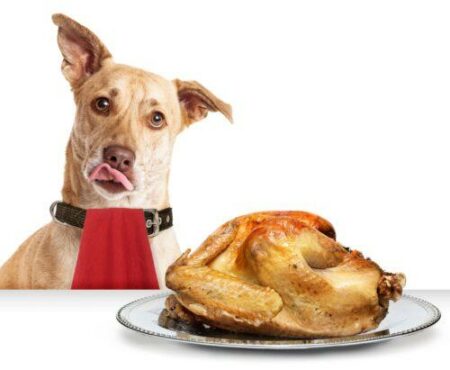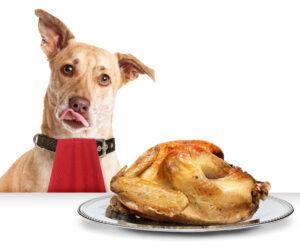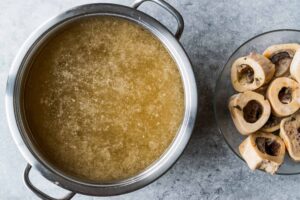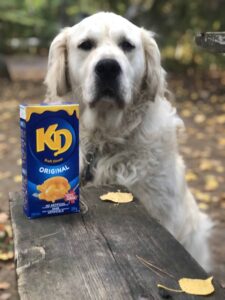Can Dogs Eat Turkey?
Dogs can safely eat boneless, skinless turkey meat. Avoid turkey skin and never give turkey bones (raw or cooked). Giblets are nutritious, but turkey necks are a choking hazard. Avoid raw turkey in dogs with cancer. Serve organic turkey where possible and make homemade turkey bone broth with leftovers.
It’s Thanksgiving, Christmas or Easter … and your dog is drooling as you pull the steamy, juicy, roasted turkey from the oven (or deep fryer).
What parts can you safely give your dog?
- White meat? Yes.
- Skin? Avoid.
- Bones? Never.
- Giblets? A little.
- Cooked or raw? Depends on his health.
- Bone broth? Absolutely. We even have a recipe!
- Gravy? Nope.
- Stuffing? No.
- Cranberries? Raw ones for dogs prone to urinary tract infections.
If you’re wondering exactly what parts of a turkey dinner you can give your dog, we’ve got all the answers right here!

Roasted Turkey & Turkey Parts
The most popular way of cooking a turkey is oven roasting. However, some people prefer to deep fry turkeys in vegetable oil. Most turkeys are prepared using added fats, salt and other seasonings. Some are stuffed with bread, fruits and vegetables and the turkey neck and giblets may or may not be used in soup or bone broth.
Can Dogs Eat Turkey Skin?
Avoid giving dogs turkey skin. Although not toxic, skin is high in fat, and often smeared with poor quality vegetable oils and seasonings which could lead to stomach upset or pancreatitis. Turkey skin can also be an unwanted source of pesticides and other toxins.
Fat, Seasonings and Toxins in Skin
Turkey skin is naturally high in fat and, although some fat is essential to a dog’s diet, eating too much can lead to pancreatitis, a potentially fatal condition that can happen when the pancreas becomes overwhelmed during digestion.
Cooking a whole turkey typically involves smearing the skin with oil or butter, herbs and seasonings. Turkeys that are deep fried hold even more oil in the skin (and poor quality vegetable oil is typically used for deep frying). Adding more fat increases the risk of digestive upset (or worse), and seasonings can irritate a dog’s stomach.
Most turkeys are raised in large confined animal feeding operations (CAFOs). In CAFOs, they are fed genetically modified grains and are pumped with steroids, added hormones and antibiotics. Since fatty skin in CAFO raised meats can contain pesticides and other toxins, it’s best to avoid giving your dog turkey skin.
Organic Turkey Skin
If you’re cooking an organic, pasture-raised turkey without added fats or seasonings, it’s safe to give your dog a small amount of skin that’s cut into small pieces to avoid choking. Just count it as part of his daily fat intake.
Can Dogs Eat White Meat?
Dogs can enjoy white turkey meat without bones or skin. White turkey meat is high in protein, B vitamins and selenium. White meat with no bones is a great treat and can also be used in home cooked dog food with the right combination of vegetables and added vitamins, minerals and healthy oils. Fresh, unprocessed turkeys without salt are best, especially for dogs with kidney or electrolyte issues.
Can Dogs Eat Dark Meat?
Dogs can enjoy a small amount of dark meat with no bones or skin. Dark meat has a little more iron and fat than white meat, and it’s also a bit higher in calories. If your dog is overweight, be mindful of the extra calories. Senior or very active dogs may benefit from the extra calories and fat.
Can Dogs Eat Turkey Bones?
Whether raw or cooked, never give a dog turkey bones. Leg bones, breast bones and all turkey bones are porous, light and break easily. Broken bones can get caught in a dog’s throat and can cause choking and death. If bone parts make it into the stomach and intestines, they can shred the gut, leading to bleeding and the need for emergency surgery. Throw away bones in a safe container or make healthy bone broth that your dog will love!
Can Dogs Eat Turkey Necks?
Turkey necks contain soft bones that a dog can choke on, if not completely broken down during the chewing process. Since a dog’s teeth and jaws are better at ripping than chewing or grinding food, avoid giving your dog turkey necks. Additionally, neck bones are not hard enough to clean a dog’s teeth which is one of the main reasons we give dogs bones. Instead of turkey bones, try giving your dog a large, raw steak bone to clean his teeth!
Can Dogs Eat Turkey Giblets?
Other than the neck, giblets are safe to feed dogs, in moderation. Giblets include organs of the turkey such as the kidneys, liver, heart and gizzards (digestive organ). Although small, these organs are very rich and nutritious. Start with half of one organ and see if your dog enjoys it. You can also fry them lightly in olive or coconut oil and add to their food as a treat. Although whole turkeys come with a nifty bag that has the neck and giblets in it, don’t give all those organs at once – they are too rich and can cause diarrhea or pancreatitis.
Since organs like kidneys and liver filter toxins from the blood, we suggest only giving your dog organs from high quality organic, pasture-fed turkeys. This helps reduce the amount of hormones, antibiotics and toxic chemicals seen in commercially raised (CAFO) animals.
Can Dogs Eat Stuffing?
Don’t let your dog eat stuffing. Stuffing contains grains like bread, spices and seasonings and extra oil. Many dogs have food sensitivities or allergies to grains, and some seasonings can irritate the stomach. Some stuffings contain raisins which are toxic to dogs. Add in the oil that stuffing absorbs from the bird fat, and this puts stuffing on the “Do Not Give” list for dogs. Instead of stuffing, treat your dog to homemade grain-free treats.
Can Dogs Eat Gravy?
Gravy is not recommended for dogs because of the fat, salt, flour and seasonings that go into that glorious taste. It’s not worth risking serious illnesses like pancreatitis, or even diarrhea. Grain-related allergies and chronic illnesses in dogs are also on the rise, so it’s prudent to limit your dog’s exposure to grains like wheat. A bit of turkey juice from an organic turkey cooked without added fats or seasonings is fine, especially if diluted with water. Better yet, make homemade bone broth from your leftovers for a healthy treat!
Can Dogs Eat Cranberries?
If you’re preparing home made cranberry sauce and have fresh raw cranberries on hand, it’s a great idea to give a few of these antioxidant- and nutrient-rich berries to your dog. In fact, dogs prone to urinary tract infections can benefit from the D-mannose found in cranberries, which deters bacteria from clinging to the bladder wall. However, once cranberries have simmered in a pot full of sugar, limit the cranberry sauce to the people who sit at the dinner table! Sugar has no role in a dog’s diet.
Can Dogs Eat Vegetable Side Dishes?
Many vegetables are safe for dogs, but they should be finely diced or lightly steamed. Carrots, sweet potatoes, broccoli, beets, celery and green beans are some favourites. Stay away from white potatoes, corn, asparagus and most mushrooms (some can be used therapeutically for some health conditions, but must be under the guidance of a Holistic Vet).
Check out our tips on the healthiest vegetables for dogs here.
Can Dogs Eat Turkey Bone Broth?
Bone broth has many healing properties and should be a part of dogs’ diets all year round. We use turkey, chicken, beef or fish bone broth to help heal a dog’s intestinal track, keep inflammation down and add extra collagen to sore joints and aging connective tissues.
Make Homemade Bone Broth for Dogs
Simmer a turkey carcass with water, a little apple cider vinegar and you have a broth that pulls all sorts of healthy minerals and nutrients from the bones! The result provides a collagen-rich broth that is delicious and incredibly nutritious. Make sure you start with an organic, pasture-raised turkey.
Make healthy bone broth at home with our classic bone broth recipe. Does your dog have arthritis or joint pain? Add the healing herbs and vegetables in this bone broth recipe to soothe and support.
Allergies and Sensitivities
It goes without saying that dogs who are allergic to turkey should not be eating turkey. In some dogs, even small amounts can cause an allergic reaction such as itchy skin, swelling of the muzzle or raised welts and hives.
Ongoing exposure to some foods like turkey can also cause distress, even days, weeks or months later. Some dogs develop skin problems like hot spots, chronic ear infections, auto-immune responses, gastrointestinal issues and inflammatory illnesses like arthritis. Highly processed, low quality turkey meat can be a root cause for skin problems and allergies. Consult a Holistic Vet to see if your dog should avoid turkey altogether or try an elimination diet to determine the best and worst protein choices.
Should a Dog Eat Raw or Cooked Turkey?
Healthy dogs can safely eat raw turkey meat which is full of protein, vitamins, minerals and enzymes. Remove skin and bones first to avoid choking risk. Popular brands of prepared raw dog food add pulverized bone and organ meat to enrich the nutritional content. Don’t give raw turkey to dogs with cancer, kidney or liver disease. Although a dog’s highly acidic stomach can neutralize potentially worrisome bacteria like salmonella, those with compromised immune systems and chronic illnesses may not be able to digest raw food as well.
Homemade diets often use cooked turkey, which is not as high in nutrients as raw meat. However, cooked meat can be easier on the stomachs of older or dogs ill with cancer, liver or kidney disorders. Vitamin supplementation is usually required for home cooked meals containing proteins like turkey.
Turkey in Kibble and Processed Dog Food
Kibble and other highly processed dog “food” is typically made from putrified turkey parts that are chemically sanitized, cooked, dehydrated and then sprayed with oil just to make it more palatable for dogs. Synthetic vitamins are then added to meet low quality standards.
It’s no wonder so many dogs are “picky eaters” – perhaps they are wise enough to know their bodies need clean, whole nutrition. Be kind to your dog and offer high quality, fresh whole foods whenever possible.
Quality Matters
Commercial Turkeys
Most fresh and frozen turkeys are commercially raised in concentrated animal feeding operations (CAFOs). In CAFOs, animals are crammed together with no room to graze or move freely. Chronically high stress leads to fights, injuries and lowered immunity. Antibiotics, vaccinations and pharmaceutical drugs are freely used to manage widespread infections and sickness. In fact, 11% of all antibiotics used for livestock are given to turkeys. This practice has contributed to the problems we see in the medical field with new antibiotic resistant infections and diseases.
In addition to animal cruelty, turkeys’ drinking water is typically contaminated with feces, bacteria and toxic runoffs from nearby industries. Profit-driven CAFO practices lead to meats that are filled with toxins, chemicals, stress hormones and medications. During processing, carcasses are injected with liquid to bloat the meat, and sodium nitrates to preserve it.
11% of all antibiotics used for livestock are given to turkeys.
Ask your local butcher or organic farm where to buy organic, humanely raised turkeys.
Be kind to your dog, all animals and the planet. Feed your dog clean meats that are humanely raised.
Pasture-Raised Organic Turkeys
A growing number of conscientious people look for turkeys that are raised to roam freely on open pastures, and fed organic grains that are free of toxins, genetically modified ingredients and pesticides. Organic turkeys aren’t exposed to the filth and cruelty of CAFOs and are typically antibiotic free.
Studies show that pasture-raised meats have more healthy omega-3 oils and fewer unhealthy fats than commercially grown (CAFO) meats.
Energetic Qualities of Turkey
Energy? In turkey meat? Yes!
Food is energy. Ancient medical traditions (like Traditional Chinese Medicine) know that certain foods help nourish the body and reduce illness through their energetic qualities. Foods can be considered warm, cool, dry or wet. Cooling foods like duck, rabbit and fish can help dogs with “hot” conditions such as allergies and inflammation. Warming foods like turkey, chicken and ham can support those who tend to have cool noses, like to snuggle in the warmth, seek the heat or have arthritis that is worsened with the cold temperatures.
If your dog suffers from allergies, hot spots or inflammation, it’s best to avoid turkey altogether.
Other Foods that Contain Turkey
Remember that commercially raised turkeys are a highly processed, lower quality meat. As it gets even more processed into food products like turkey bacon, turkey wieners or deli slices, it becomes a worse choice for your dog. These highly processed meats add salt, spices, nitrates, preservatives and casings to make it palatable.
Although it’s safe to occasionally wrap pills or vitamins in small amounts of processed turkey products, don’t give more than necessary to your beautiful Fur Soul.
What Parts of a Turkey Can a Dog Eat?
Keep your dog healthy and happy during turkey season with boneless white or dark meat, small amounts of giblets (no necks) and turkey bone broth. A side dish of steamed vegetables provides balanced nutrition.
Dogs can eat these turkey parts in moderation:
- White and dark meat (no bones)
- Giblets in moderation (liver, kidneys and heart – not neck)
- Bone broth made from organic turkeys
- Raw pasture-raised turkey (no bones, ground up in balanced commercial or home-prepared meals). Avoid raw food in dogs with cancer.
- A few raw cranberries
- Carrots, sweet potato, broccoli, beets, celery (steamed or boiled)
Can Dogs Get Sick Eating Turkey?
Dogs can choke on turkey bones and large pieces of skin. They can also develop diarrhea, vomiting or show signs of food sensitivities from eating turkey. Avoid giving raw turkey to dogs with cancer or other immune-related illnesses, and never give turkey bones, necks or side dishes like gravy, stuffing or cranberry sauce.
Don’t give your dog these turkey parts:
- Turkey bones or necks (raw or cooked)
- Skin (small amount of cut-up skin from organic turkeys with no added fat or seasoning is ok)
- Gravy
- Cranberry sauce
- Stuffing
- White potatoes, corn, asparagus, mushrooms
- Turkey bacon
Be kind to all living beings. Respect the earth we share.










